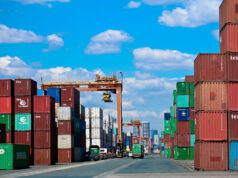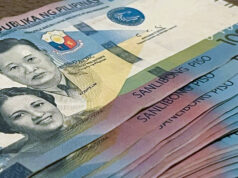Poll puts May price hike past target
By Melissa Luz T. Lopez
Senior Reporter
HIGHER OIL and food prices drove inflation even faster in May from a year ago to a fresh five-year high, analysts said in a BusinessWorld poll, even as the Finance department said in a bulletin that month-on-month tracking may signal slowing momentum ahead.
A poll among 10 economists yielded a median estimate of 4.9%, which if realized will be the highest inflation rate in at least five years.
The median falls near the midpoint of the 4.6-5.4% range given last week by the Bangko Sentral ng Pilipinas (BSP) and matches the estimate given by the Department of Finance for May.
It also means that inflation will pick up for the fifth straight month from April’s 4.5%, surging from 2.9% in May 2017.
Such a pace in May will push year-to-date inflation further past the ceiling of the central bank’s 2-4% full-year target range that had already been pierced in April.

The Philippine Statistics Authority will release official inflation data tomorrow.
The Finance department said in its bulletin that “inflationary momentum, however, appears to be receding” as the month-on-month change in prices of widely used goods slowed to 0.32% in May from 0.52% in April.
“Inflation may appear to be rising year-on-year but it is actually decelerating as month-on-month inflation continues to drop,” the bulletin read.
Sought for comment, Michael L. Ricafort, economist at Rizal Commercial Banking Corp., said via e-mail: “Inflation has increased since the start of 2018 due to higher global crude oil prices, higher US dollar/peso exchange rate among 12-year highs, higher taxes under the TRAIN (Tax Reform for Acceleration and Inclusion) law and resulting second-round inflation effects in terms of upward adjustments in the prices of affected goods and services.”
Low stocks drove rice prices higher, economists said, adding to price upticks attributed to new taxes on cigarettes and liquor.
Alvin P. Ang, economics professor at the Ateneo de Manila University, noted that seasonal price adjustments ahead of the start of classes likely stoked inflation pressures.
Retail pump prices shot up last month to reflect world crude prices, which hit their highest levels in over three years, while the peso continued its depreciation to P52.70 versus the greenback in May.
Several lawmakers want to suspend implementation of the TRAIN law in a bid to temper inflation, especially the provision that raised the excise tax on fuel products. Next year will see mid-term elections for both chambers of Congress.
Analysts said suspending tax reform implementation would be a bad idea as it would derail the government’s infrastructure spending programs and, consequently, economic growth.
“[T]his may not address a probable runaway inflation level moving forward. There are other inefficiencies in the local economy that are putting upward pressure on price levels,” said Ruben Carlo O. Asuncion, chief economist at Union Bank of the Philippines.
The Finance department attributed the spike in petroleum prices to rising global oil prices and the peso’s depreciation, rather than higher excise taxes. It added that “[a] meaningful drop in prices is attainable if the food supply problem is solved because food accounts for 35.5% of the consumer basket,” as it pushed a bill in Congress to shift to rice tariffs from the current quota system for imports as a way to temper price increases of the staple.
With inflation expected to rise further, more analysts are pricing in another rate hike from the central bank by the third quarter.
“The continual increase in inflation, I think, will likely lead to an increase in inflation expectations of consumers and firms. This buildup in inflation expectations, I believe, will likely increase future inflation, and therefore raises the probability of another policy rate hike by the BSP this year,” Security Bank Corp. economist Angelo B. Taningco said, noting that he expects the decision by August.
Another rate hike may be necessary to “manage the persistent weakness of the country’s currency,” added Guian Angelo S. Dumalagan, market economist at Land Bank of the Philippines.
The BSP announced a 25-basis-point rate hike on May 10, the first increase in nearly four years.
The central bank has conceded to missing its 2-4% inflation target for 2018, as latest estimates showed that the full-year pace could average 4.6%.
Emmanuel J. Lopez, chairman of the University of Santo Tomas Department of Economics, said however: “I don’t see the immediate need to temper price adjustments because local economic conditions are not the main culprit for the current acceleration in price and inflation.”



